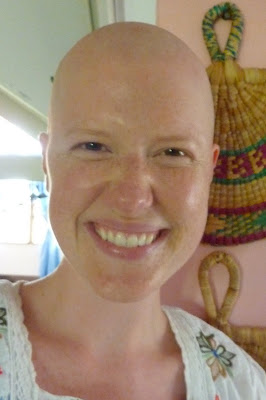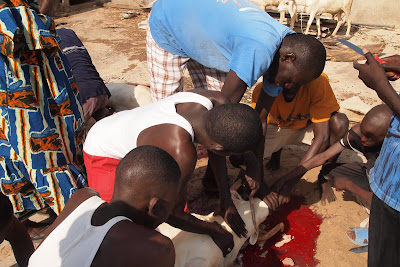GRADES: Kaolack, the Land of Flies, Salty Water, and Sandy Running Paths
Much awaited was my visit to Kaolack and short internship with GRADES (Group of Reflection and Action for the Development of Senegal). Before leaving for Kaolack, my family in Pikine told me three things about the city: there is a lot of theft, it’s dirty and the water is salty, and there are more flies than in Dakar. Sounds like a nice place, huh? Knowing that humans are prone to exaggeration, I had no doubt that I would find something good about this new city and region, in spite of the negative lot of characterizing details I received prior to my travels. Certainly I was right: I found many good things that I liked about Kaolack; unfortunately, so was everyone else.
I traveled to Kaolack to assist GRADES in writing their Strategic Plan 2012-2016. I left Sebikotan and arrived in the city nearly four hours later when the sun was high in the sky and fiercely strong. My host told me that his wife had recently been mildly, physically assaulted and robbed by a motorcycle driver; he encouraged me to be careful. As for it being a dirty city, I did not see any dissimilarities between Kaolack and Dakar if not maybe a little less congested and a little cleaner although it is really hard to compare considering Dakar is roughly 20 times as big as Kaolack, so on a proportional level perhaps Kaolack takes the cake. The water is without a doubt salty, but thankfully my hosts kept ice in a small cooler, so we drank cold, salty water, which surpasses by leaps and bounds tepid, salty water. Finally, everyone who had told me that Kaolack was fly capital was not exaggerating one iota. I have never seen so many flies in my life. Upon sitting outside for one minute, my legs and clothes were covered with flies. I took to my room beneath my fabulous mosquito net to escape from those nefarious insects. They disappeared at night when the mosquitoes took up sentry.
During the two weeks, I conducted interviews with key GRADES members and volunteers who run the inter-workings of the pre-school and the training center for young women. Beginning with my hosts, I met a core group of individuals who are impassioned by the opportunity to change their community. I admire their efforts, to enhance the academic and professional lives of small children (aged 2 to 6) and young women (aged between 15 and 35) respectively. Accompanied by GRADES these small children and young women are encircled with support and provided with an education and with training that enables them to perform well in school and in the working world. GRADES is active also in raising awareness in the community on children’s and women’s rights, reproductive health, AIDS, premature marriages and divorce, and proper civic comportment. . I also spent one day working with a local women’s group that transforms corn meal and millet flour in a process called arraw into couscous, fondé—local porridge, and thiakry, a type of cereal consumed with sweetened yogurt. The technique was a bit difficult to master, but I got the hang of it, I think, after about four hours of work!
The people with whom I stayed provided me with my own room, which was absolutely delightful. I had all that I could ever need: a fan to keep me from overheating at night, a mosquito net to keep me from getting eaten alive while sleeping and incredibly annoyed while working during the day, a little table to put some of my toiletries and accessories, and enough room on the floor to take out my sacks from my monstrous and obtrusive backpack (containing my pants/skirt, my and appreciated. Situated at the exterior of the city, I was able to run every other morning on country paths full of sand, dodging donkey and horse carts carrying firewood, animal feed, farming equipment or people into town. Somehow having access to running paths in the superb African countryside makes any stay a little more pleasurable. I plan to continue my internship with GRADES, hoping that by the end of my time here in Senegal they have received the partners they need to sustain their commendable work.
Tip # 6 for Surviving in Senegal: The faster you become accustomed to drinking various beverages from a plastic bag, the sooner you will have a myriad of inexpensive, local choices to assuage your thirst and hunger. Plastic sacks must be less expensive or more mobile than disposable cups. Senegalese people drink water, juice, milk, and even cereal from plastic bags, purchased from roadside vendors, cart-pushing vendors, peddlers at the bus station that enter the bus and sell you your meal, your snack and your refreshments, and at social ceremonies (marriages, baptisms, funerals). Bite the corner off and suck away. Don’t worry about finding a trash can, your world is your garbage dump!
I traveled to Kaolack to assist GRADES in writing their Strategic Plan 2012-2016. I left Sebikotan and arrived in the city nearly four hours later when the sun was high in the sky and fiercely strong. My host told me that his wife had recently been mildly, physically assaulted and robbed by a motorcycle driver; he encouraged me to be careful. As for it being a dirty city, I did not see any dissimilarities between Kaolack and Dakar if not maybe a little less congested and a little cleaner although it is really hard to compare considering Dakar is roughly 20 times as big as Kaolack, so on a proportional level perhaps Kaolack takes the cake. The water is without a doubt salty, but thankfully my hosts kept ice in a small cooler, so we drank cold, salty water, which surpasses by leaps and bounds tepid, salty water. Finally, everyone who had told me that Kaolack was fly capital was not exaggerating one iota. I have never seen so many flies in my life. Upon sitting outside for one minute, my legs and clothes were covered with flies. I took to my room beneath my fabulous mosquito net to escape from those nefarious insects. They disappeared at night when the mosquitoes took up sentry.
During the two weeks, I conducted interviews with key GRADES members and volunteers who run the inter-workings of the pre-school and the training center for young women. Beginning with my hosts, I met a core group of individuals who are impassioned by the opportunity to change their community. I admire their efforts, to enhance the academic and professional lives of small children (aged 2 to 6) and young women (aged between 15 and 35) respectively. Accompanied by GRADES these small children and young women are encircled with support and provided with an education and with training that enables them to perform well in school and in the working world. GRADES is active also in raising awareness in the community on children’s and women’s rights, reproductive health, AIDS, premature marriages and divorce, and proper civic comportment. . I also spent one day working with a local women’s group that transforms corn meal and millet flour in a process called arraw into couscous, fondé—local porridge, and thiakry, a type of cereal consumed with sweetened yogurt. The technique was a bit difficult to master, but I got the hang of it, I think, after about four hours of work!
The people with whom I stayed provided me with my own room, which was absolutely delightful. I had all that I could ever need: a fan to keep me from overheating at night, a mosquito net to keep me from getting eaten alive while sleeping and incredibly annoyed while working during the day, a little table to put some of my toiletries and accessories, and enough room on the floor to take out my sacks from my monstrous and obtrusive backpack (containing my pants/skirt, my and appreciated. Situated at the exterior of the city, I was able to run every other morning on country paths full of sand, dodging donkey and horse carts carrying firewood, animal feed, farming equipment or people into town. Somehow having access to running paths in the superb African countryside makes any stay a little more pleasurable. I plan to continue my internship with GRADES, hoping that by the end of my time here in Senegal they have received the partners they need to sustain their commendable work.
Tip # 6 for Surviving in Senegal: The faster you become accustomed to drinking various beverages from a plastic bag, the sooner you will have a myriad of inexpensive, local choices to assuage your thirst and hunger. Plastic sacks must be less expensive or more mobile than disposable cups. Senegalese people drink water, juice, milk, and even cereal from plastic bags, purchased from roadside vendors, cart-pushing vendors, peddlers at the bus station that enter the bus and sell you your meal, your snack and your refreshments, and at social ceremonies (marriages, baptisms, funerals). Bite the corner off and suck away. Don’t worry about finding a trash can, your world is your garbage dump!









Comments